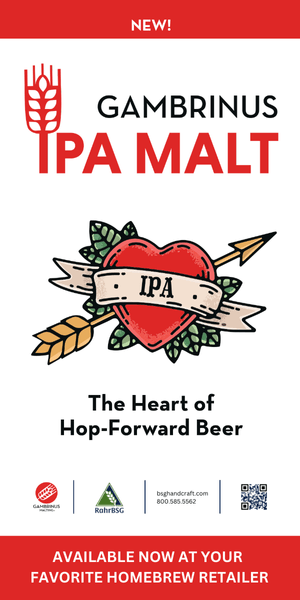Trillium Brewing Company: Fort Point Pale Ale clone
Trillium Brewing Company: Fort Point Pale Ale clone
(5 gallons/19 L, all-grain)
OG = 1.060 FG = 1.013
IBU = 45 SRM = 5 ABV = 6.6%
Trillium’s website describes this beer as, “Layers of hops-derived aromas and flavors of citrus zest and tropical fruit rest on a pleasing malt backbone. Dangerously drinkable with a dry finish and soft mouthfeel from wheat. Our year round hoppy pale ale culminates in a restrained bitterness and dry finish.”
Ingredients
10 lbs. (4.3 kg) 2-row pale malt
1.5 lbs. (0.68 kg) wheat malt
12 oz. (0.34 kg) dextrine malt
4 oz. (113 g) British pale crystal malt (22 °L)
3.5 AAU Columbus hops (60 min.) (0.25 oz./7 g at 14% alpha acids)
10.5 AAU Columbus hops (10 min.) (0.75 oz./21 g at 14% alpha acids)
2 oz. (57 g) Columbus hops (hop stand)
4 oz. (113 g) Citra® hops (dry hop)
1 oz. (28 g) Columbus hops (dry hop)
1⁄2 Whirlfloc® tablet (10 min.)
White Labs WLP007 (Dry English Ale) or Wyeast 1098 (British Ale) or Gigayeast GY054 (Vermont IPA) yeast
3⁄4 cups (150 g) dextrose (if priming)
Step by Step
Crush the malt and add to 4 gallons (15 L) strike water to achieve a stable mash temperature at 150 °F (65.5 °C) until enzymatic conversion is complete. Sparge slowly with 170 °F (77 °C) water, collecting wort until the pre-boil kettle volume is 6 gallons (23 L). Boil the wort for 60 minutes, adding the hops as indicated. After the boil is finished, cool the wort to 180 °F (82 °C) and then add the hop stand addition. Stir the wort, then let settle for 30 minutes before chilling the wort down to yeast-pitching temperature. Now transfer to the fermenter and pitch the yeast. Ferment at 68 °F (20 °C). As the kräusen begins to fall, typically day four or five, add the dry hops to the fermenter and let the beer sit on the hops for five days. Bottle with priming sugar or keg and force carbonate to 2.4 volumes CO2.
Extract with grains option:
Replace the 2-row pale malt and wheat malt in the all-grain recipe with 6.6 lbs. (3 kg) golden liquid malt extract and 1 lb. (0.45 kg) wheat dried malt extract. Reduce the dextrine malt 4 oz. (113 g). Place the crushed malt in a muslin bag. Steep the grains in 1 gallon (4 L) of water at 160 °F (71 °C) for 20 minutes. Remove the grain bag and wash with 2 qts. (2 L) of hot water. Top off the kettle to 5 gallons (19 L) and heat up to boil. As soon as the water begins to boil, remove the brew pot from the heat and stir in the dried and liquid malt extracts. Stir until all the extract is dissolved then return the wort to a boil. Boil the wort for 60 minutes. Follow the remaining portion of the all-grain recipe
Tips for Success:
Trillium Head Brewer JC Tetreault suggests building a water profile for this beer starting with soft water. “Supplement the mash with gypsum and calcium chloride to about a 2:1 ratio. This ensures sufficiently assertive hop character but still provides a softer finish.” I think maybe a 100:50 ppm ratio would be a good starting point and you can adjust from there.
Handling the post fermentation beer with the utmost care to avoid introducing oxygen in any form is key in retaining those precious hop oils that Trillium Brewing Co. has become known for. JC adds his dry hops while primary fermentation is nearing completion, “in order to ensure good aromatic pre-cursor bioconversion. Ideally, dry hop in a keg under a little head pressure to avoid blowing off aromatics with the escaping carbonation. We strongly recommend force carbonating hop forward beers. Purge the keg with CO2 and add the dry hops in a fine mesh bag along with some sanitized stainless weights or glass marbles. Tie the fine mesh bag to the lid with some teflon floss (ie. Glide) to suspend the hops off the bottom of the keg.” Beware of “beer volcanoes” when adding hops to the primary fermenter before terminal gravity, as the hops can create a nucleation point to release dissolved CO2, creating a volcano effect on the beer, which can lead to a significant amount of beer loss and a giant mess.
JC is also well known for having hop variations on base beer recipes. Don’t be afraid to substitute out Citra® in the dry hop for Mosaic™, Galaxy, or El Dorado®. He will also at times double dry hop his beers, so splitting the dry hops may help add a new dimension.
Written by Dave Green

Trillium’s website describes this beer as, “Layers of hops-derived aromas and flavors of citrus zest and tropical fruit rest on a pleasing malt backbone. Dangerously drinkable with a dry finish and soft mouthfeel from wheat. Our year round hoppy pale ale culminates in a restrained bitterness and dry finish.”



